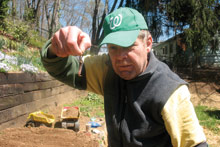Folks today dig in dirt because they like to. Sure, plenty of small growers raise flowers and vegetables, hawking their yields at seasonal markets. But most backyard gardeners do it for relaxation, love of nature, tradition or some hybrid thereof.

If you grew up in rural, 1950s America, however, and happened to be the oldest boy in a sprawling Irish-Catholic family, gardening might have come to mean something else entirely.
“It was all about coercion,” says my dad, Jim McGee. It’s a sunny afternoon, and he’s helping us plant our little West Asheville veggie patch. Sipping a cold MGD, he talks about the acre he once worked at the behest of his own father, a somewhat sadistic patriarch who drove his kids into the rows at age 6.
“We didn’t plant until Memorial Day weekend,” Jim recalls, referring to the short growing season of his birthplace, Pearl Creek. Boasting a current population of 92, this railroad-bisected hamlet in Wyoming County, N.Y., is tucked irretrievably deep inside the Great Lakes Snowbelt, home of glacier-carved Letchworth State Park. Another county landmark is the infamous Attica Correctional Facility, where a 1971 prison revolt resulted in 39 deaths.
“If you had any plans for the holiday,” my father goes on, “Dad would cancel them for you. Sometimes he let us listen to the Indianapolis 500 on the radio while we worked, but that was it.” As the garden grew, “It was my job to keep it weeded—and believe me, I couldn’t do anything else until that was done.”
Despite such cynical recollections, Jim admits he didn’t toil alone. “Everyone who lived out in the country had a garden back then,” he says. “You didn’t buy your produce, you grew it.” And he notes with pride: “We had tons of potatoes, of course, [and] tomatoes, string beans, cucumbers, beets and all kinds of squash. My mother canned the tomatoes and made penny pickles from the cucumbers, and she was the fastest pea-sheller on the East Coast.” For a seasonal delicacy, Grandma McGee mixed the peas with milk, baby potatoes, butter and salt, my dad recalls.
Other garden highlights included the summer’s first sweet corn and the carrots and turnips planted late so they’d last through the first freeze.
Pressed further, my dad confesses that he enjoyed growing vegetables—or at least was damn good at it: He won the Wyoming County Fair Agricultural Blue Ribbon in 1959, at age 14, for his exhibit of thriving peanuts.
“You weren’t supposed to be able to grow them up north,” he explains. “I got the prize because no one knew what they were.”
A few months ago, Jim uprooted and moved down to Asheville to get to know my son, Beau, his only grandchild. Dad lives in a studio in Oakley, growing basil and peppers in makeshift planters on the apartment house’s sagging back deck, and he works in the produce department of the nearby Wal-Mart Supercenter, where he’s amused by the random resurgence of vegetables he’s been enjoying his whole life. Take trendy kohlrabi, for instance. “It tastes great, but you have to cook the crap out of it,” my dad remarks.
Raw greens are another story. A sort of accidental vegetarian, my dad once disrupted the buffet line at a niece’s wedding by stripping an entire catering tray of its decorative kale border. (“I couldn’t find anything else I wanted to eat,” he later apologized.)
And yet Jim isn’t really in tune with Asheville’s cosmic plenitude, especially its organic craze. In fact, he’s prone to voicing wry, contrarian views when there are lots of people within hearing range. In the crowded seed section at Jesse Israel and Sons, he recently bugled, “Why would anyone pay three times as much for this stuff?” I turned as red as a packet of ‘Scarlet Charlotte’ Swiss chard and feigned interest in a handy display of watering cans. Dangerous pesticides? Dismissed with a snort and another childhood recollection: “We practically ate DDT for breakfast, and we turned out fine.”
Nevertheless, age—or, more specifically, grandparenthood—tends to soften a man. As we plant tidy rows of squash, peas and potatoes behind the house, he informs me, “You probably wouldn’t want to put fertilizer in this dirt if the baby likes to play in it.”
Jim worries, too, that his grandson will miss what has been, up to now, his own toddler-sized construction site. “We’ll leave a section unplanted so Beau-Beau can still dig with his trucks,” he says while scooping out holes for the pepper plants. Up comes a wriggling critter, which he holds aloft for general inspection, delivering a soliloquy on its impressive soil-aeration capability before tucking it back in the ground.
“Bye-bye, worm,” he mutters, patting the earth into place. “Now get down there and do your job.”
[Melanie McGee Bianchi is a stay-at-home mom and freelance journalist.]



Before you comment
The comments section is here to provide a platform for civil dialogue on the issues we face together as a local community. Xpress is committed to offering this platform for all voices, but when the tone of the discussion gets nasty or strays off topic, we believe many people choose not to participate. Xpress editors are determined to moderate comments to ensure a constructive interchange is maintained. All comments judged not to be in keeping with the spirit of civil discourse will be removed and repeat violators will be banned. See here for our terms of service. Thank you for being part of this effort to promote respectful discussion.